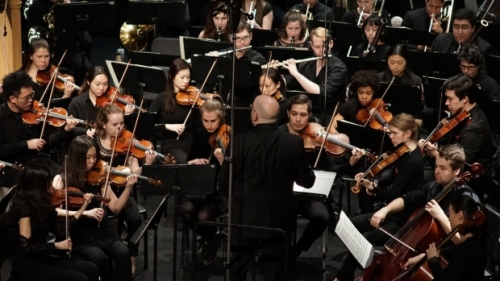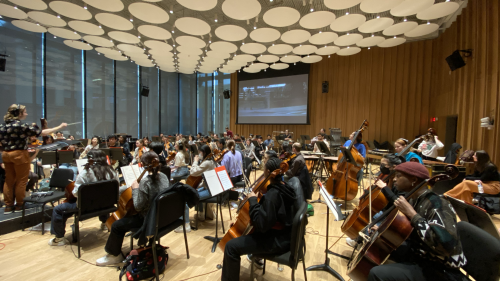From February 4 through April 27, NYU Steinhardt will present free music, theater, and dance events as part of the Fall of the Weimar Republic: Dancing on the Precipice festival focused on pre-World War II Germany.
Faculty and students from NYU Steinhardt will present five events in February, March, and April as part of Carnegie Hall’s city-wide festival examining the rich artistic life that flourished in Germany between 1919 and 1933.

The NYU Contemporary Music Ensemble will perform as part of the city-wide festival celebrating the art of the Weimar Republic.
Running from January through May at the landmark concert hall and at dozens of cultural and educational institutions around the city, Fall of the Weimar Republic: Dancing on the Precipice examines the fertile cultural environment of the Weimar period, which emerged from the devastation of World War I. Through a broad range of performing arts, the festival reflects on the forces that led to the Republic’s fall while simultaneously tying its history to current events threatening democracies around the world.
“It is part of our mission to use our art to participate in vital discussions,” says Marilyn Nonken, chair of NYU Steinhardt’s Department of Music and Music Professions and a concert pianist. “The festival is not only about dance and music and film and drama, but also about political issues that are incredibly pressing, ranging from class, race, and sexual orientation to the role of art in society.”
“It’s wonderful to give students this platform – being associated with Carnegie Hall and presenting on a city-wide stage – to share their work and become aware, as artists, that their art has impact,” she adds.
Highlighting the festival are performances by the Cleveland Orchestra, the Vienna Philharmonic, the National Symphony Orchestra under the direction of Gianandrea Noseda, and the Bavarian Radio Symphony Orchestra conducted by Sir Simon Rattle. Jazz pianist Jason Moran, postmodern cabaret performer Meow Meow, and cabaret artist and actress Ute Lemper will also perform. The full schedule is on the concert hall’s website.
Steinhardt’s contribution includes the screening of Der Golem, a 1920 German silent film that is considered a masterpiece of Expressionism and a precursor to modern horror movies.
To accompany the film, students in the program in Instrumental Performance will premiere a score collaboratively composed by students in the program in Screen Scoring.
“This event represents the kind of intense interdisciplinary collaboration which is unique to our department,” Nonken explains. “It is one of the many opportunities that we offer.”
The Steinhardt performances are free and open to the public. Advance tickets are available online or at the Skirball box office. Seats may also be available at the venue on the day of the event on a first come, first served basis.
The Art of Not Falling: Arnold Schönberg at 150
February 4 at 8 p.m.
Black Box Theater in Pless Hall
26 Washington Place
Pianist Marilyn Nonken and soprano Deborah Norin-Kuehn perform a concert that charts the transformation that composer Schönberg underwent during the Weimar years. Nonken studied with Leonard Stein, the composer’s assistant.
Der Golem
March 6 and 7 at 8 p.m.
The Iris Cantor Theatre
38 W. Houston St.
Jonathan Haas conducts the NYU Contemporary Music Ensemble in live performances of an original score composed by NYU Steinhardt Screen Scoring students for the 1920 horror film directed by Paul Wegener and Carl Boese. The movie predicts the Jewish persecution at the hands of the Nazis.
Bertolt Brecht and the 21st Century Verfremdung
March 9 at 7:30 p.m.
John A. Paulson Center, Room 620
181 Mercer St.
NYU’s Verbatim Performance Lab examines Bertol Brecht’s concept of Verfremdung, or defamiliarization, which originated in the Weimar period. Using Brecht’s testimony before the House Un-American Activities Committee in 1947 and examples from current politics and culture, the Lab will investigate Brecht’s idea that how something is said can be as important as what is said.
Piano Music of the Weimar Era
April 24 at 8 p.m.
Black Box Theater in Pless Hall
26 Washington Place
NYU pianists perform a program of works by Hanns Eisler and other composers of the period.
Love Thy Neighbor
April 26 and 27 at 8 p.m.
Frederick Loewe Theater
35 W. 4th St.
Original dance choreography by Deborah Damast, clinical associate professor and director of NYU’s Dance Education program, is set to music by Max Raabe, the German jazz singer and founder/leader of the Palast Orchester. The work was inspired by and pays tribute to Weimar Cabaret, and is presented as part of Dance Education's Spring 2024 Masters' Dance Concert.
Press Contact
(212) 998-6829

